Developing an International Face of Fusion
Following the success of FIF SMN application two mutual visits were made. Professor Ramesh visited BU during Nov-Dec 2012 for 5 weeks. This was followed by a week visit by Dr Zulfiqar Khan during Feb 2013 to PES Institute of Technology, Bangalore, India. This activity resulted in significant achievements over all areas of FUSION in research, education and professional practice. Both Prof. C S Ramesh and Dr Zulfiqar Khan participated in teaching activities at BU and PES IT Bangalore respectively.
Education
Participation in education has resulted in enhanced students’ experience at level C and H. Level H students have produced journal publications, a major achievement of this activity and has provided example of engaging UG students in research activities through research informed education. Students’ engagement with research has enhanced their experience at BU, awareness of the international activities and advancement in nano-technology and nano materials. Publications by UG students will play a very significant role in the promotion of BU and raising its academic profile at international stage as leader in FUSION.
Research/Professional Practice
This programme provided opportunity of developing research proposals and bidding for external funding in collaboration with external academic and industrial partners.
One research proposals was developed in collaboration with academic partners as PES Institute of Technology, Bangalore, India, Visvesvaraya Technological University and industrial partners National Aerospace Laboratories India, Bharat Heavy Electricals Ltd India, Gas Turbine Research Establishment India and Ingersoll Rand India to target EPSRC-DST initiative. Through the development and submission of research proposal for the EPSRC-DST (BU/PESIT India) application significant industrial links have been initiated and will be further strengthened in near future, through the formation of an International Consortium in Renewable Energy & Renewable Technology (RERT).
A second research proposal was developed with PES Institute of Technology, Bangalore, India to target World Bank initiative in Technical Education Quality Improvement Programme (TEQIP).
A joint research proposal to Erasmus Mundus JASMINE Techno III has been submitted as part of the fusion activity and has provided opportunity to increase and further strengthen collaborative links with cross-channel (France), EU & Indian partners.
In addition the proposed programme within FIF SMN resulted in publications of three journal papers of which two were published with the final year Design Engineering students. Four conference papers were submitted/ published of which 1 conference paper was submitted with UG final year Design Engineering student and PGR.
Further Plans
It is aimed to form an international consortium and strengthen exiting partnerships around the world including key academic partners such as PES Institute of Technology, Bangalore, India, Visvesvaraya Technological University, India, GIK Institute of Technology, Pakistan and Wisconsin-University Milwaukee, US.
This partnership will pave way for exploring future opportunities of tapping into external funds e.g. National Science Foundation (NSF), The World Bank, EPSRC-DST (Department of Science and Technology India), developing and submitting joint research proposals, developing case studies for UG and PGT taught provisions and staff/students exchanges.
Fusion in Action Conference
During the Fusion in Action Conference on Thursday April 18, 2013 the highlights of the programme in terms of activities in research, education and professional practice and successes to date were presented, which has been uploaded Fusion in Action 180413.
Finally I would like to thank BU for providing such a fantastic opportunity within FIF and the School for their continued support during the programme.
Dr Zulfiqar Khan
Director Sustainable Design Research Centre
DEC




























 REF Code of Practice consultation is open!
REF Code of Practice consultation is open! BU Leads AI-Driven Work Package in EU Horizon SUSHEAS Project
BU Leads AI-Driven Work Package in EU Horizon SUSHEAS Project Evidence Synthesis Centre open at Kathmandu University
Evidence Synthesis Centre open at Kathmandu University Expand Your Impact: Collaboration and Networking Workshops for Researchers
Expand Your Impact: Collaboration and Networking Workshops for Researchers ECR Funding Open Call: Research Culture & Community Grant – Apply now
ECR Funding Open Call: Research Culture & Community Grant – Apply now ECR Funding Open Call: Research Culture & Community Grant – Application Deadline Friday 12 December
ECR Funding Open Call: Research Culture & Community Grant – Application Deadline Friday 12 December MSCA Postdoctoral Fellowships 2025 Call
MSCA Postdoctoral Fellowships 2025 Call ERC Advanced Grant 2025 Webinar
ERC Advanced Grant 2025 Webinar Update on UKRO services
Update on UKRO services European research project exploring use of ‘virtual twins’ to better manage metabolic associated fatty liver disease
European research project exploring use of ‘virtual twins’ to better manage metabolic associated fatty liver disease